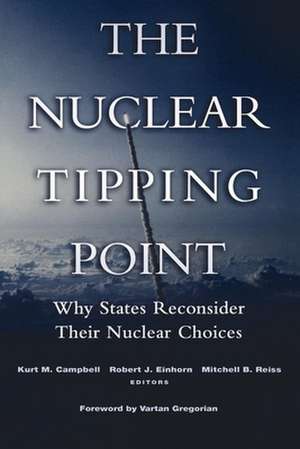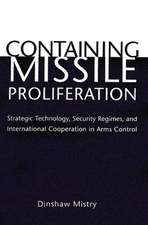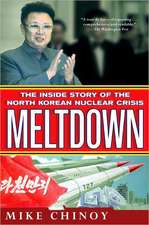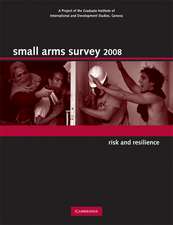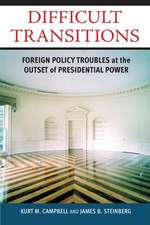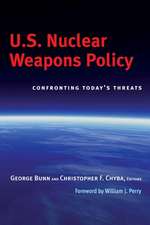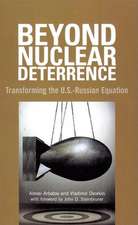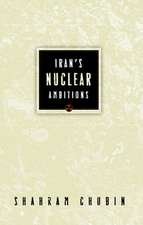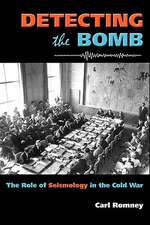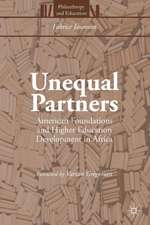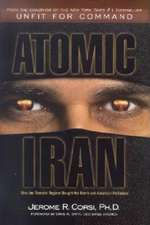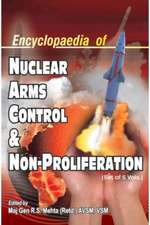The Nuclear Tipping Point: Why States Reconsider Their Nuclear Choices
Editat de Kurt M. Campbell, Robert J. Einhorn, Mitchell B. Reiss Cuvânt înainte de Vartan Gregorianen Limba Engleză Paperback – 23 iun 2004
More than half a century after the advent of the nuclear age, is the world approaching a tipping point that will unleash an epidemic of nuclear proliferation? Today many of the building blocks of a nuclear arsenal—scientific and engineering expertise, precision machine tools, software, design information—are more readily available than ever before. The nuclear pretensions of so-called rogue states and terrorist organizations are much discussed. But how firm is the resolve of those countries that historically have chosen to forswear nuclear weapons? A combination of changes in the international environment could set off a domino effect, with countries scrambling to develop nuclear weapons so as not to be left behind—or to develop nuclear "hedge" capacities that would allow them to build nuclear arsenals relatively quickly, if necessary. Th e Nuclear Tipping Point examines the factors, both domestic and transnational, that shape nuclear policy. The authors, distinguished scholars and foreign policy practitioners with extensive government experience, develop a framework for understanding why certain countries may originally have decided to renounce nuclear weapons—and pinpoint some more recent country-specific factors that could give them cause to reconsider. Case studies of eight long-term stalwarts of the nonproliferation regime—Egypt, Germany, Japan, Saudi Arabia, South Korea, Syria, Turkey, and Taiwan—flesh out this framework and show how even these countries might be pushed over the edge of a nuclear tipping point. The authors offer prescriptions that would both prevent such countries from reconsidering their nuclear option and avert proliferation by others. The stakes are enormous and success is far from assured. To keep the tipping point beyond reach, the authors argue, the international community will have to act with unity, imagination, and strength, and Washington's leadership will be essential. Contributors include Leon Feurth, George Washington University; Ellen Laipson, Stimson Center; Thomas W. Lippman, Middle East Institute; Jenifer Mackby, Center for Strategic and International Studies; Derek J. Mitchell, Center for Strategic and International Studies; Jonathan D. Pollack, U.S. Naval War College; Walter B. Slocombe, Caplin and Drysdale; and Tsuyoshi Sunohara, Center for Strategic and International Studies.
Preț: 250.68 lei
Nou
Puncte Express: 376
Preț estimativ în valută:
47.97€ • 50.31$ • 39.93£
47.97€ • 50.31$ • 39.93£
Carte tipărită la comandă
Livrare economică 02-16 aprilie
Preluare comenzi: 021 569.72.76
Specificații
ISBN-13: 9780815713319
ISBN-10: 0815713312
Pagini: 367
Dimensiuni: 152 x 229 x 26 mm
Greutate: 0.52 kg
Editura: Brookings Institution Press
Colecția Brookings Institution Press
Locul publicării:United States
ISBN-10: 0815713312
Pagini: 367
Dimensiuni: 152 x 229 x 26 mm
Greutate: 0.52 kg
Editura: Brookings Institution Press
Colecția Brookings Institution Press
Locul publicării:United States
Notă biografică
Kurt M. Campbell is CEO and cofounder of the Center for a New American Security. He served as deputy assistant secretary of defense for Asia and the Pacific in the Clinton administration. Before that, he taught at Harvard University's John F. Kennedy School of Government and served in the Navy. His books include Hard Power:The New Politics of National Security, written with Michael O'Hanlon (Basic Books, 2006). Robert J. Einhorn is senior adviser in the international security program at the Center for Strategic and International Studies and former assistant secretary for noproliferation at the Department of State. Mitchell B. Reiss was director of the Reves Center for International Studies at the College of William and Mary. Vartan Gregorian is president of the Carnegie Corporation of New York. Born in Tabriz, Iran of Armenian parents, he received his elementary education in Iran, secondary education in Lebanon, and higher education in the United States. He has served as president of Brown University, president of the New York Public Library, and founding dean and provost of the Faculty of Arts and Sciences at the University of Pennsylvania. President Clinton awarded him the National Humanities Medal in 1998.
Descriere
More than half a century after the advent of the nuclear age, is the world approaching a tipping point that will unleash an epidemic of nuclear proliferation? Today many of the building blocks of a nuclear arsenal—scientific and engineering expertise, precision machine tools, software, design information—are more readily available than ever before. The nuclear pretensions of so-called rogue states and terrorist organizations are much discussed. But how firm is the resolve of those countries that historically have chosen to forswear nuclear weapons? A combination of changes in the international environment could set off a domino effect, with countries scrambling to develop nuclear weapons so as not to be left behind—or to develop nuclear "hedge" capacities that would allow them to build nuclear arsenals relatively quickly, if necessary. Th e Nuclear Tipping Point examines the factors, both domestic and transnational, that shape nuclear policy. The authors, distinguished scholars and foreign policy practitioners with extensive government experience, develop a framework for understanding why certain countries may originally have decided to renounce nuclear weapons—and pinpoint some more recent country-specific factors that could give them cause to reconsider. Case studies of eight long-term stalwarts of the nonproliferation regime—Egypt, Germany, Japan, Saudi Arabia, South Korea, Syria, Turkey, and Taiwan—flesh out this framework and show how even these countries might be pushed over the edge of a nuclear tipping point. The authors offer prescriptions that would both prevent such countries from reconsidering their nuclear option and avert proliferation by others. The stakes are enormous and success is far from assured. To keep the tipping point beyond reach, the authors argue, the international community will have to act with unity, imagination, and strength, and Washington's leadership will be essential. Contributors include Leon Feurth, George Wash
